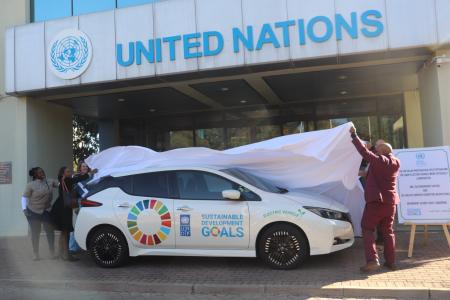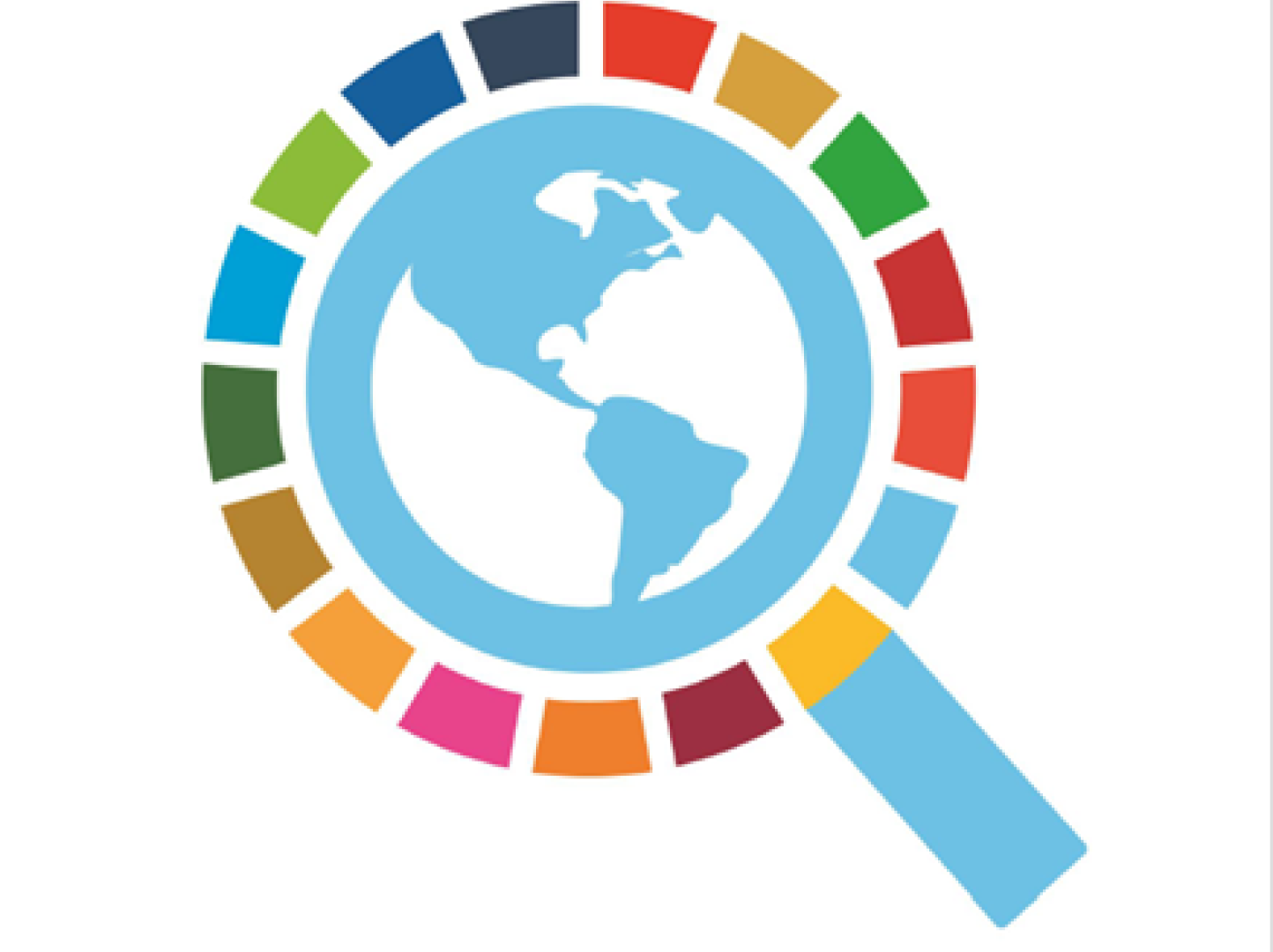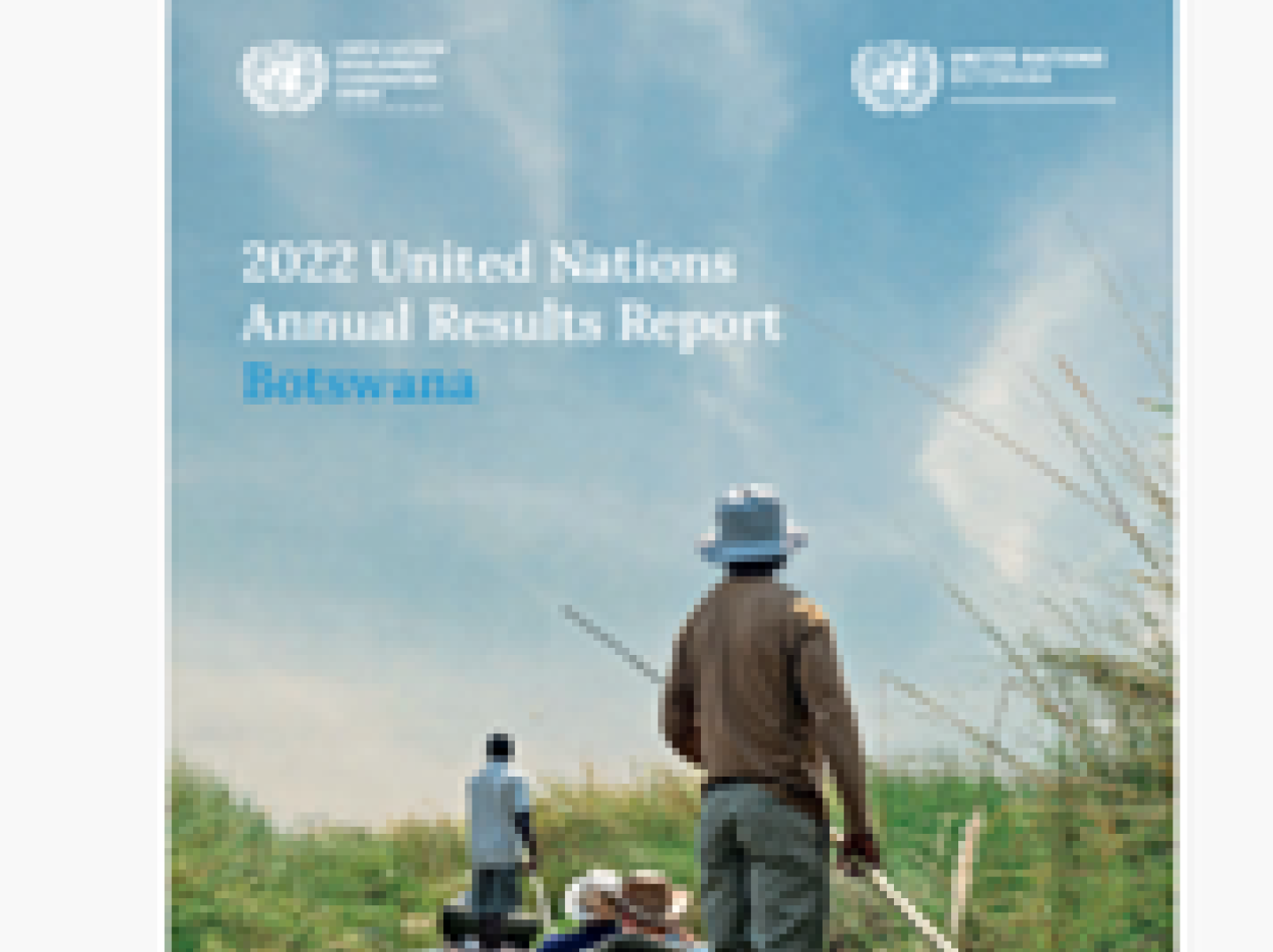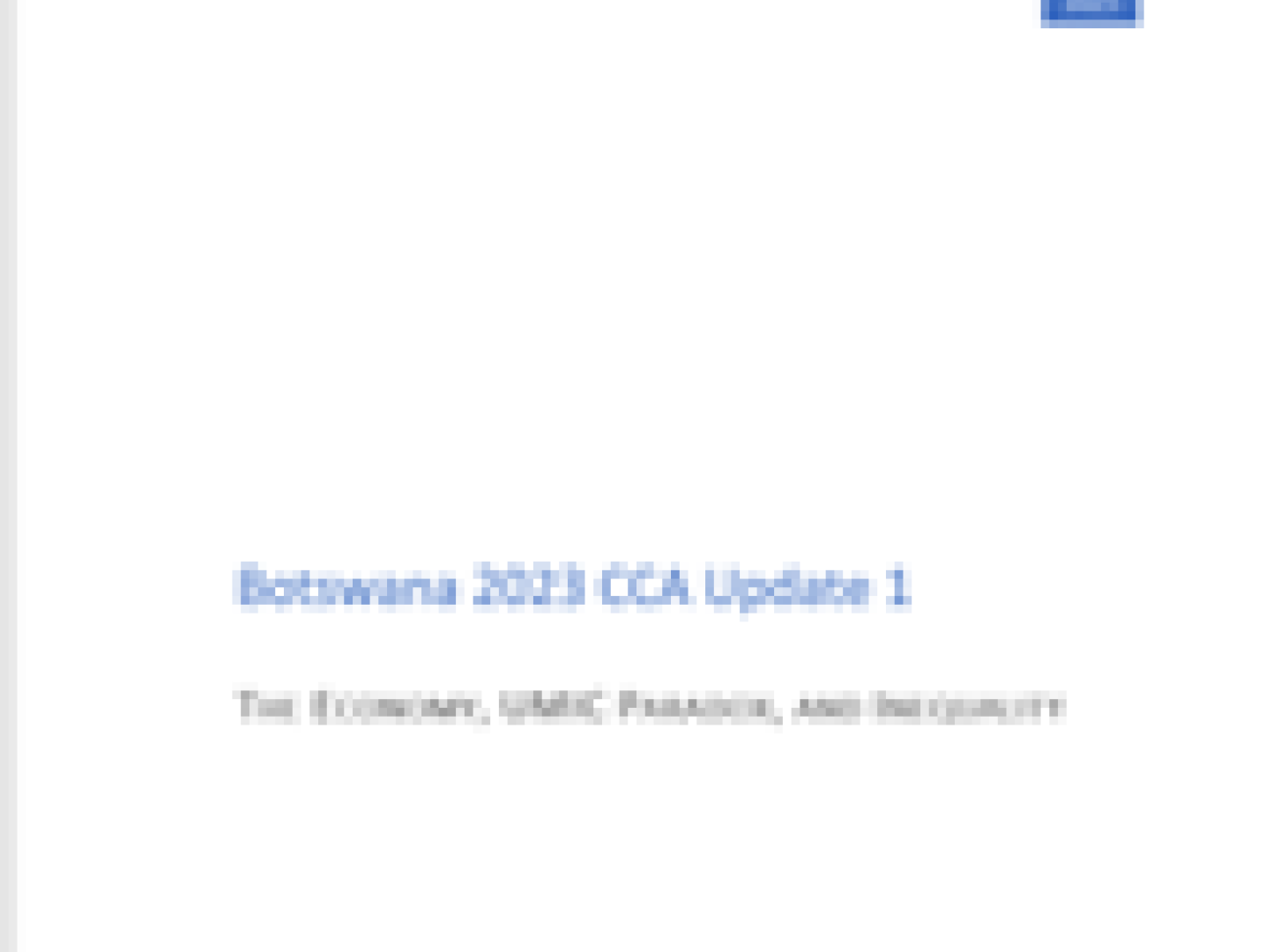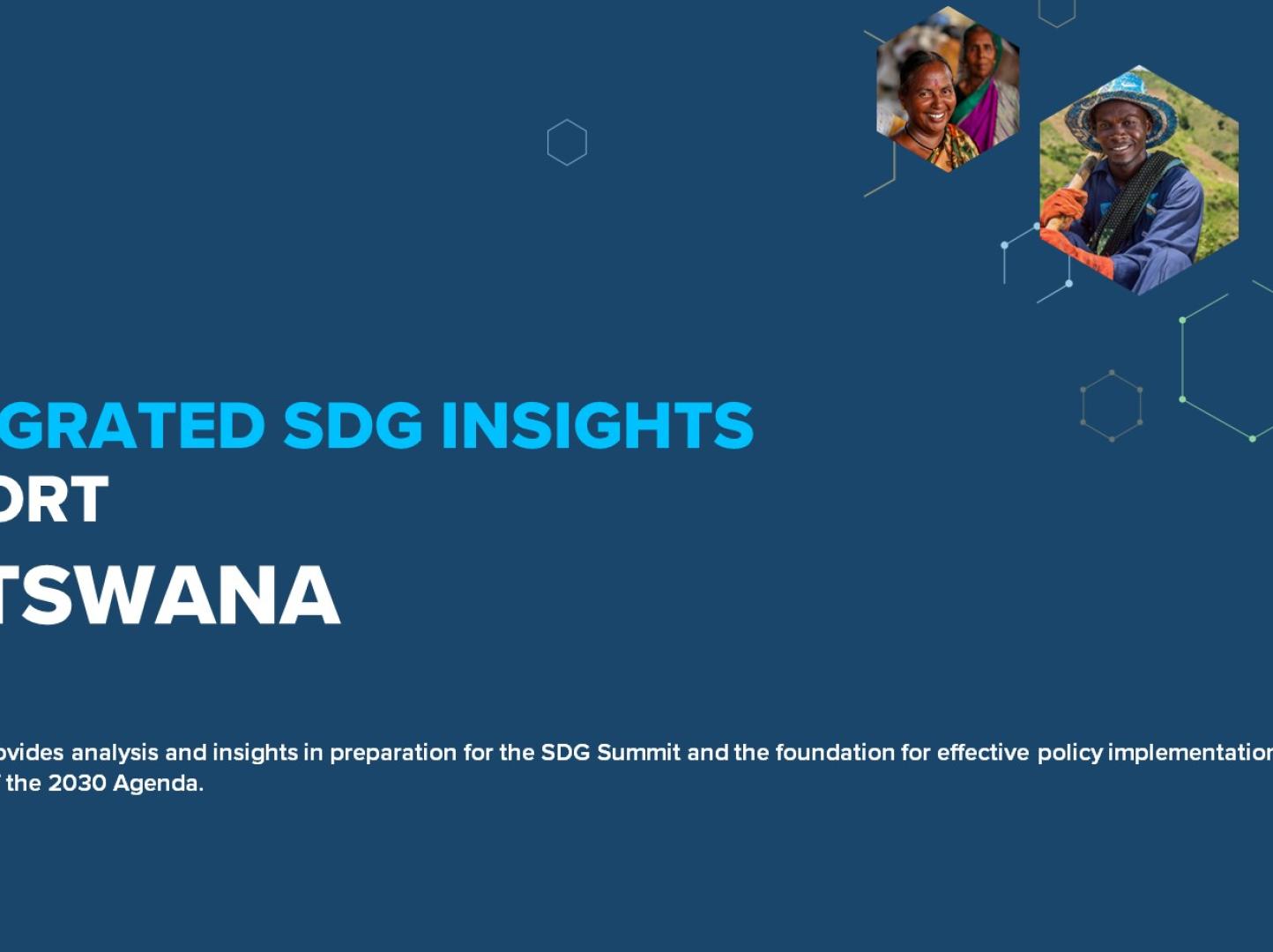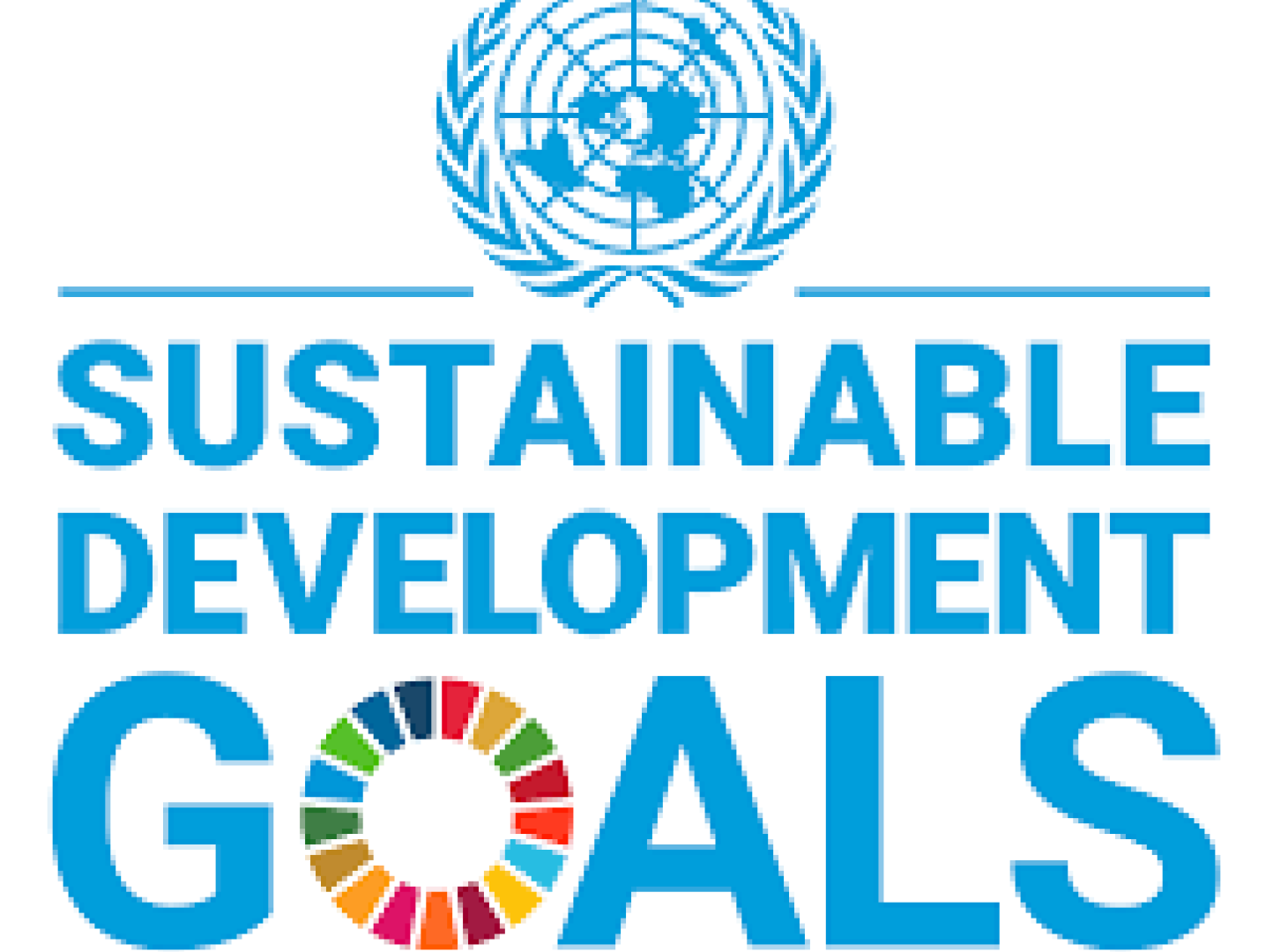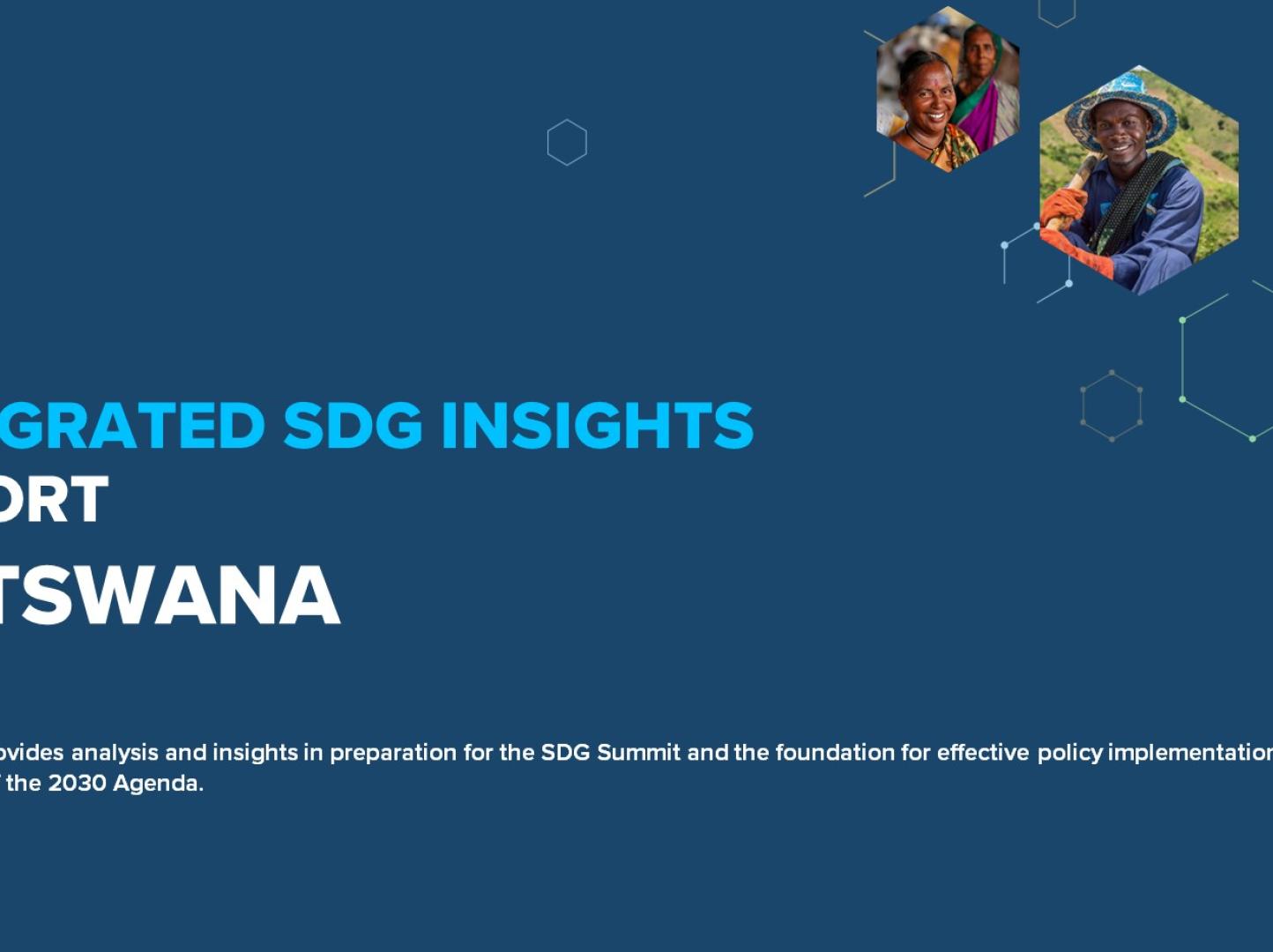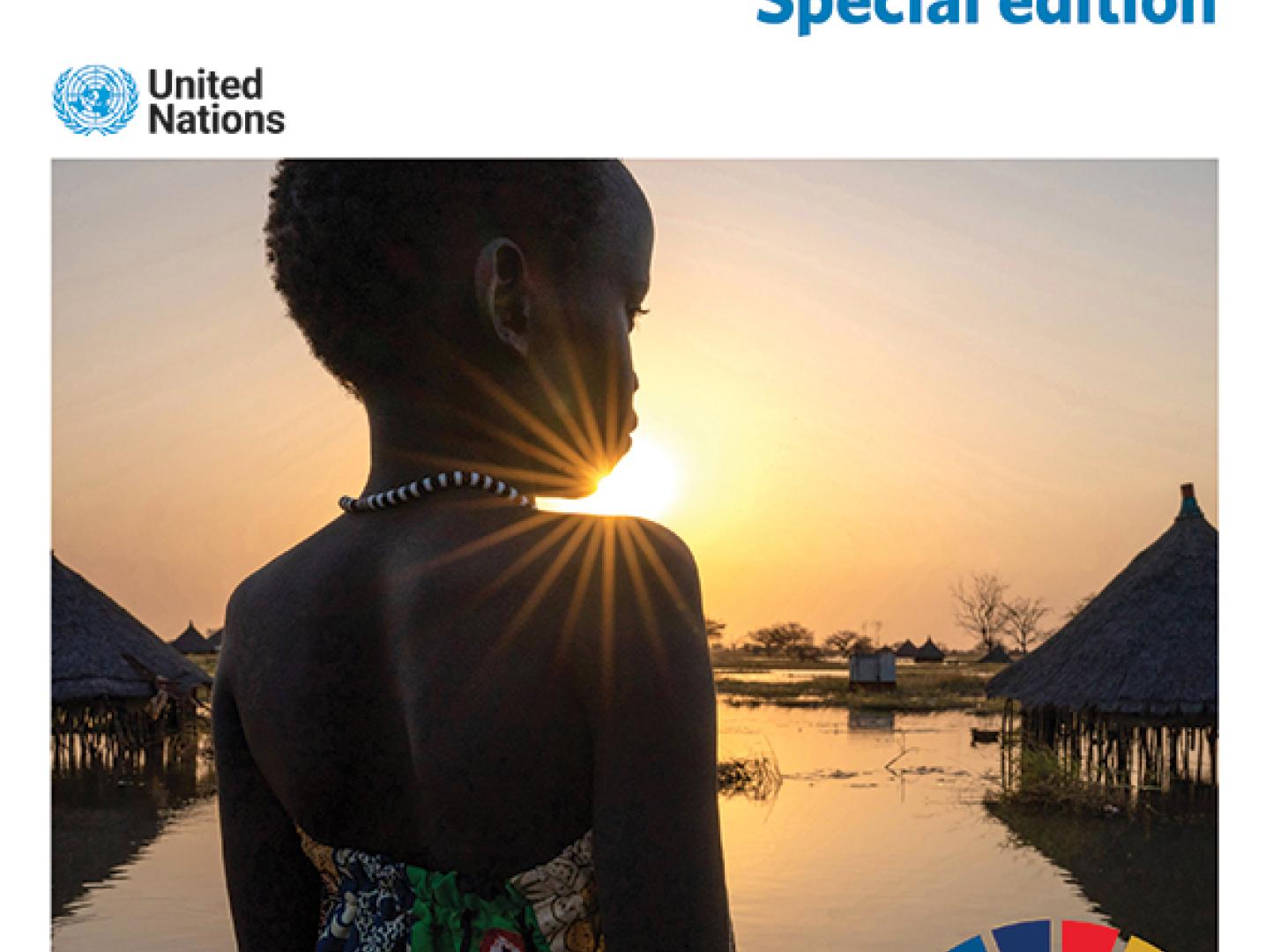Latest
The Sustainable Development Goals in Botswana
The Sustainable Development Goals are a global call to action to end poverty, protect the earth’s environment and climate, and ensure that people everywhere can enjoy peace and prosperity. These are the goals the UN is working on in Botswana:
Story
24 November 2025
Botswana - UN Joint Steering Committee convenes
The Joint Steering Committee Meeting (JSC) for the United Nations (UN) Sustainable Development Cooperation Framework co-organised by the Government of Botswana and the UN took place on 20 November, with an emphasis on Joint Approaches and Partnerships to accelerate the Sustainable Development Goals (SDGs). The JSC guides the strategic implementation of the Cooperation Framework 2022 - 2026 and comprises senior representatives from both the Government and UN. It provides strategic direction, alignment with national priorities and effective coordination to address the country’s development needs, with particular attention to vulnerable and marginalized groups. With less than five years left to achieve the 2030 Agenda and SDGs, the Cooperation Framework sets out the collective response of the UN agencies in partnership with government and national stakeholders to accelerate gender equality, natural resource management, climate change resilience, and sustainable economic growth.The JSC was co-chaired by the Permanent Secretary in the Ministry of International Relations, Ambassador Thuso Ramodimoosi and the UN Resident Coordinator, Ms. Wenyan Yang. The JSC discussed UNSDCF joint workplans, identify challenges, and agree on priorities for the next implementation phase.“The UNSDCF is not just a cooperation framework—it is our shared responsibility to deliver real, measurable progress for the people of Botswana. The success of the CF in Botswana will demonstrate how effective coordination and shared accountability can translate global commitments into tangible national impact. This is not just a technical exercise – it is about ensuring that our collective efforts translate into tangible improvements in people’s lives”, said UN Resident Coordinator, Ms. Yang.During the opening session, among others, Ambassador Ramodimoosi, expressed appreciation for the support the UN renders to Botswana and her development endeavours. He also underscored that the Cooperation Framework is a true reflection of multilateralism in action, and that it serves as a resourceful tool that can effectively support Botswana’s Economic and Transformation Programme.The meeting is a testimony to the ongoing fruitful partnership between the Government of Botswana and the UN, underlining their shared commitment to building a sustainable and inclusive future for all.
1 of 5
Story
06 November 2025
Botswana Considers Steps to Ratify Key International Human Rights Treaties
Botswana has taken important steps to adhere to international human rights standards. From 14-16 October the United Nations in Botswana, together with the Office of the High Commissioner for Human Rights (OHCHR) and the UN Refugee Agency (UNHCR), convened a three-day consultation on the country’s accession to two landmark international treaties; the International Covenant on Economic, Social and Cultural Rights (ICESCR) and the 1961 Convention on the Reduction of Statelessness.Funded by the Universal Periodic Review (UPR) Voluntary Fund and with the support of UNHCR, the consultation brought together senior government officials, civil society representatives, legal scholars and UN entities to examine the treaties’ implications for Botswana’s legal and policy framework.At the heart of the discussions was a shared conviction that aligning Botswana’s laws with these instruments would not only strengthen protection for people at risk of statelessness but also advance the fulfilment of rights to education, health, housing and decent work for all citizens.“Discussing both the ICESCR and the 1961 Convention simultaneously acknowledges the holistic nature of human dignity,” said Wenyan Yang, the UN Resident Coordinator in Botswana. “Accession will strengthen Botswana’s international credibility and leadership in SDG implementation, enabling better monitoring, reporting, and access to global partnerships and technical support. The RC also reinforced that accension will further boost Botswana’s standing as a regional leader in governance and rights.Strengthening Rights Through ICESCRPart of the discussions focused on the International Covenant on Economic, Social and Cultural Rights, a foundational UN treaty elaborating on the rights to education, health, social security and an adequate standard of living.Abigail Noko, the UN Human Rights Regional Representative for Southern Africa, underscored that accession to the Covenant would mark a transformative step for Botswana’s development agenda. As the three-day consultation concluded, Noko, reminded participants that, “Acceding to the ICESCR will strengthen our collective efforts to ensure that every person enjoys the right education, health, decent work, and an adequate standard of living, without discrimination or exclusion. This consultation has shown that the path toward accession is both achievable and transformative. It will require sustained collaboration across government institutions, civil society, and international partners to ensure that commitments translate into meaningful change.” A Step Toward Ending StatelessnessThe Convention on the Reduction of Statelessness, adopted in 1961, obliges States to prevent statelessness by establishing safeguards in nationality laws, particularly for children who might otherwise be left without a nationality. To date, more than 80 States have acceded to the treaty.Jesus Sanchez, UNHCR’s Senior Protection Officer, noted Botswana’s steady progress in this area, citing key legal reforms such as the 1995 amendment that ended gender discrimination in citizenship law and the recent 2024 Citizenship Amendment Act, which strengthened protections for foundlings and streamlined nationality procedures.“Nationality is the fundamental status that grants an individual a legal claim to protection, participation, and personhood in the global system,” Sanchez said. “By taking these progressive steps on statelessness, Botswana has reaffirmed that no person within its sphere is left without the essential legal foundation for a life of dignity.”A Path ForwardAs Botswana considers accession to these key treaties, participants emphasized that the process is not merely a legal exercise but a reaffirmation of the nation’s enduring commitment to equality, inclusion, and human dignity. Botswana stands at the threshold of joining a growing community of nations committed to reducing statelessness and guaranteeing the full spectrum of economic, social, and cultural rights for all.
1 of 5
Story
29 October 2025
UN in Botswana celebrates UN80
The United Nations (UN) in Botswana commemorated the UN at 80 with a Walk/ Run to promote awareness and actions about the Sustainable Development Goals (SDGs). This year marks the 80th anniversary of the United Nations, held under the theme: “Building our future together.”
The event, marking a significant milestone in the international community’s history was graced by the Acting President of Botswana Ndaba Gaolathe, diplomatic community and the public.
The celebration was commemorated with a run/walk event, designed not only to honour the founding of this impactful organization but also to highlight and promote the ongoing commitment to the sustainable development goals.
Speaking at the event, UN Resident Coordinator Ms Wenyan Yang said the Walk and Run for the SDGs was symbolic of the UN vision of a world united in peace, dignity and prosperity. Ms Yang said they were reminded that achieving the SDGs was not a sprint but a marathon of collective effort. She said each step represented their shared journey towards ending poverty, protecting the planet and ensuring that no one was left behind. She also said the presence of the Acting President, Mr Gaolathe underscored the government’s commitment to partnership and multilateralism.
In his remarks, the Acting President Mr Gaolathe said Botswana’s, sustainable development aligned directly with Sustainable Development Goals (SDGs) ensuring that every national effort reflected the people’s aspirations for prosperity, equality and resilience. He said Botswana’s progress as a nation demonstrated what persistence could achieve. “The proportion of Batswana now living below the poverty line has dropped. Primary cchool enrolment remains above 95 per cent. Women now occupy nearly half of senior positions in the public service, showing that empowerment is a driver of better governance,” he added.
He said through the Botswana Economic Transformation Program (BETP) government was creating an economy that could generate jobs and add value to communities, guided by a vision to create the best governed country in the African continent. He said that UN and Botswana joint initiatives strengthened livelihoods with over P440 million, stating that through such initiatives access to education had been expanded and that empowerment of women and youth was also being realised.
The UN’s engagement in Botswana spans a wide range of sectors; from urban planning, environmental resilience and public health, to refugee support, child welfare, youth empowerment and governance. As the country marked the 80th anniversary of the UN, it is also looking ahead to the Summit of the Future in 2026 and to the Decade of Action that still lies before us. The road may be long, but with unity, purpose, and partnership — we can cross the finish line stronger than ever.
The event, marking a significant milestone in the international community’s history was graced by the Acting President of Botswana Ndaba Gaolathe, diplomatic community and the public.
The celebration was commemorated with a run/walk event, designed not only to honour the founding of this impactful organization but also to highlight and promote the ongoing commitment to the sustainable development goals.
Speaking at the event, UN Resident Coordinator Ms Wenyan Yang said the Walk and Run for the SDGs was symbolic of the UN vision of a world united in peace, dignity and prosperity. Ms Yang said they were reminded that achieving the SDGs was not a sprint but a marathon of collective effort. She said each step represented their shared journey towards ending poverty, protecting the planet and ensuring that no one was left behind. She also said the presence of the Acting President, Mr Gaolathe underscored the government’s commitment to partnership and multilateralism.
In his remarks, the Acting President Mr Gaolathe said Botswana’s, sustainable development aligned directly with Sustainable Development Goals (SDGs) ensuring that every national effort reflected the people’s aspirations for prosperity, equality and resilience. He said Botswana’s progress as a nation demonstrated what persistence could achieve. “The proportion of Batswana now living below the poverty line has dropped. Primary cchool enrolment remains above 95 per cent. Women now occupy nearly half of senior positions in the public service, showing that empowerment is a driver of better governance,” he added.
He said through the Botswana Economic Transformation Program (BETP) government was creating an economy that could generate jobs and add value to communities, guided by a vision to create the best governed country in the African continent. He said that UN and Botswana joint initiatives strengthened livelihoods with over P440 million, stating that through such initiatives access to education had been expanded and that empowerment of women and youth was also being realised.
The UN’s engagement in Botswana spans a wide range of sectors; from urban planning, environmental resilience and public health, to refugee support, child welfare, youth empowerment and governance. As the country marked the 80th anniversary of the UN, it is also looking ahead to the Summit of the Future in 2026 and to the Decade of Action that still lies before us. The road may be long, but with unity, purpose, and partnership — we can cross the finish line stronger than ever.
1 of 5
Story
08 August 2025
President Officially Opens UN - Habitat Sub Regional Office for Southern Africa
In an historic milestone, H. E. Advocate Duma Gideon Boko officially opened the UN-Habitat Regional Office for Southern Africa based in Gaborone, Botswana, marking a significant step in strengthening sustainable urban development and regional cooperation. The office will promote housing and sustainable urban development aligned with Agenda 2063, the New Urban Agenda, and the Sustainable Development Goals, especially SDG 11, which seeks to make cities inclusive, safe, resilient, and sustainable.Speaking at the ceremony in Gaborone, the capital of Botswana, President Duma Boko emphasized that the UN-Habitat's presence would bolster the country's efforts to achieve affordable housing for all by leveraging global expertise, technical resources, and policy experience."Your global expertise, technical resources, and policy experience will be instrumental in helping us design and implement tailored solutions, from informal settlement upgrades and slum prevention to climate-resilient infrastructure and inclusive urban planning for youth and gender equity," Boko said.He highlighted urbanization as one of Botswana's major challenges, with nearly 70 percent of the population now residing in urban areas. Wenyan Yang, UN Resident Coordinator in Botswana, noted that the new hub positions UN-Habitat to better serve Southern Africa by functioning as a platform for policy advice, capacity development, and knowledge exchange. Key focus areas include housing, land governance, smart cities, and climate adaptation."It enhances our technical support to the government and anchors our efforts in one of today's most dynamic development priorities, urban transformation," Yang said.Anaclaudia Rossbach, Executive Director of the UN-Habitat, described the hub as a testament to the shared commitment to tackling the region's most pressing urban challenges."This initiative stems from the Memorandum of Understanding between UN-Habitat and Botswana, outlining our collaboration to advance sustainable urban development in line with (African Union) Agenda 2063, the New Urban Agenda, and the (United Nations) Sustainable Development Goals (SDG), particularly SDG 11, which aims to make cities inclusive, safe, resilient, and sustainable," Rossbach explained.
1 of 5

Story
12 June 2025
Solar-powered UN House lights the way for a greener and more efficient Botswana
The United Nations in Botswana has inaugurated the “Office Energy Efficient Project”, a 75kWp rooftop solar photovoltaic system, and an electric vehicle.The newly installed system will meet the office's daily energy needs with 141,959kWh per year, with 50,081kWh sold back to the grid. The system will provide the office with a US$11,566.00 reduction in electricity costs annually and 201 tonnes of total carbon emissions savings yearly. After ten years, a return on investment will be achieved. This supports the United Nations Sustainable Development Goals (SDGs), while also promoting green energy solutions and inspiring local communities to adopt similar solutions.This move comes with the UN's revised Business Operations Strategy (BOS) that guides strategic planning, management, monitoring, and reporting of the UN Country Team's joint support. EXTRAORDINARY BENEFITSThe new solar powered office contributes to five sustainable development goals, spotlighting an extraordinary achievement. SDG 7: Affordable and clean energySDG 9: Industry, innovation and infrastructureSDG 11: Sustainable cities and communitiesSDG 12: Responsible consumption and productionSDG 13: Climate action"In Botswana, our road to the 2030 Agenda for Sustainable Development starts at home. Our solar energy system can be a model for other UN Country Offices to show how we can jointly, sustainably and effectively tackle greenhouse emissions while reducing operational costs, and scale up support across the United Nations System. Greening our business operations can help maximise efficiency, improve productivity, and in turn support the transition of the country to a more sustainable energy future," said UN Botswana Resident Coordinator Zia Choudhury. AN IDEAL ENVIRONMENT FOR CLEAN ENERGYBotswana possesses the ideal geography, topography, and climate for a seamless transition to renewable energy. Across Botswana, there is an average of 3332 hours of sunlight per year (of a possible 4383) with an average of 9:07 of sunlight per day. suitable for solar energy solutions. UNDP also unveiled an electric vehicle which will be powered by the solar PV system, marking a significant step towards sustainable transportation. “UNDP urges more stakeholders to embrace electric mobility as a vital move towards reducing emissions and preserving the environment,” said UNDP Resident Representative Balazs Horvath.
E-Mobility is a crucial factor in the sustainable growth of the UN system, aiming to achieve zero-carbon emissions and promote risk-informed sustainable development. This includes the substitution of Internal Combustion Engines (ICE) with cleaner energy alternatives. In line with the UN's commitment to the 'Smart UN Facilities and the Sustainable Development Goals', this solar project shows how a UN Common premises can work in action, and how the United Nations Sustainable Development Coordination Framework can be coherently implemented in countries.
E-Mobility is a crucial factor in the sustainable growth of the UN system, aiming to achieve zero-carbon emissions and promote risk-informed sustainable development. This includes the substitution of Internal Combustion Engines (ICE) with cleaner energy alternatives. In line with the UN's commitment to the 'Smart UN Facilities and the Sustainable Development Goals', this solar project shows how a UN Common premises can work in action, and how the United Nations Sustainable Development Coordination Framework can be coherently implemented in countries.
1 of 5
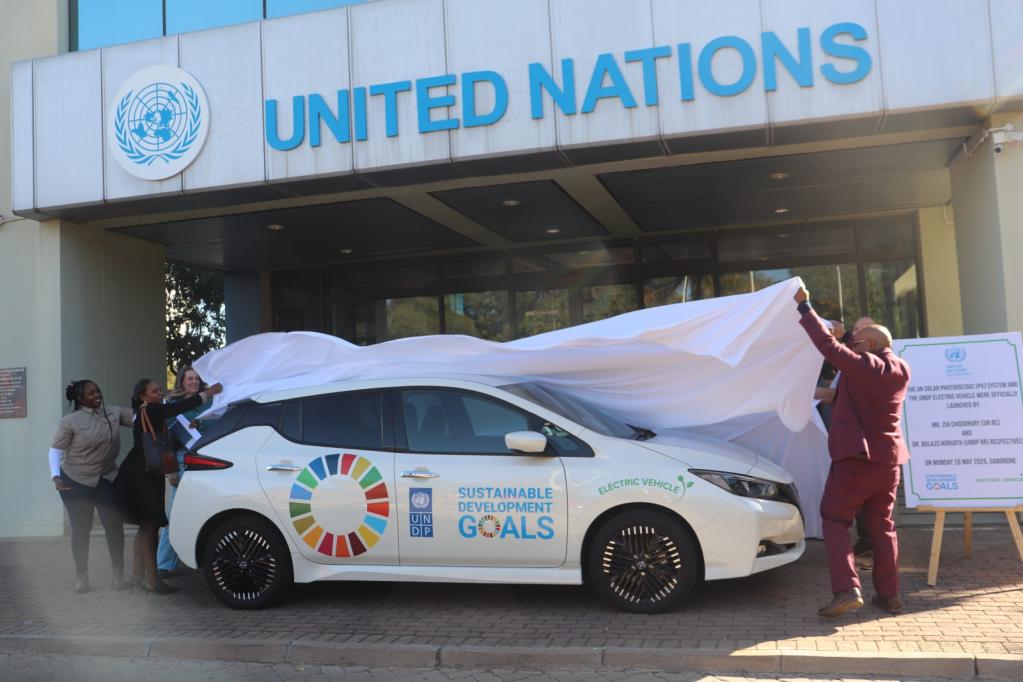
Press Release
17 July 2025
A Moment of Opportunity: Speech by the Secretary-General on Climate Change
As part of his 2025 climate strategy, United Nations Secretary-General António Guterres will deliver a pivotal global address on 22 July 2025, from 9:00 a.m. to 10:00 a.m. EDT (3:00pm to 4:00pm Botswana time), live from UN Headquarters in New York. Titled “Moment of Opportunity”, the speech is expected to reset the global climate narrative by making a powerful economic case for a just and inclusive energy transition.The Secretary-General will outline the progress made since the Paris Agreement was adopted a decade ago, examine the barriers that continue to stall climate action, and make a bold call to speed up pathways to energy transitions.The address is intended to build global momentum in the lead-up to key multilateral forums and national decision-making processes. It aims to inspire bolder commitments ahead of major international milestones such as the 2025 UN Climate Change Conference and to inform the next generation of national climate action plans, including Botswana’s forthcoming third round of Nationally Determined Contributions, which are being led with the support of UNDP.The Secretary-General’s address will also underscore how transitioning to clean and affordable energy is not only feasible, but vital to delivering jobs, economic growth, energy security, and resilience, especially for developing countries. It will challenge the outdated perception that climate action is too costly, instead presenting evidence that greater investment in renewable energy is sound economic policy.The United Nations is inviting policy makers, civil society organizations, private sector, youth and members of the public to join the Secretary General as he unpacks the speech to the global community.Event Details:
Title: Moment of Opportunity: A Global Climate Address by the UN Secretary-General
Date: Tuesday, 22 July 2025
Time: 9:00 a.m. – 10:00 a.m. EDT (3:00 p.m. – 4:00 p.m. Botswana Time)
Location: United Nations Headquarters, New York |
Title: Moment of Opportunity: A Global Climate Address by the UN Secretary-General
Date: Tuesday, 22 July 2025
Time: 9:00 a.m. – 10:00 a.m. EDT (3:00 p.m. – 4:00 p.m. Botswana Time)
Location: United Nations Headquarters, New York |
1 of 5
Press Release
02 May 2023
Botswana’s human rights record to be examined by Universal Periodic Review
Botswana is one of 14 States to be reviewed by the UPR Working Group during its upcoming 43rd session from 1 to 12 May 2023. Botswana’s first, second and third UPR reviews took place in December 2008, January 2013 and January 2018, respectively.
The documents on which the reviews are based re: 1) national report - information provided by the State under review; 2) information contained in the reports of independent human rights experts and groups, known as the Special Procedures, human rights treaty bodies, and other UN entities; 3) information provided by other stakeholders including national human rights institutions, regional organizations, and civil society groups.
The three reports serving as the basis for the review of Botswana on 3 May can be found here.
Location: Room 20, Palais des Nations, Geneva
Time and date: 9:00 – 12:30, Wednesday, 3 May 2023 (Geneva time, GMT +2 hours)
The UPR is a unique process which involves a periodic review of the human rights records of all 193 UN Member States. Since its first meeting was held in April 2008, all 193 UN member States have been reviewed thrice within the first, second and third UPR cycles. During the fourth UPR cycle, States are again expected to spell out steps they have taken to implement recommendations posed during their previous reviews which they committed to follow up on and highlight recent human rights developments in the country.
The delegation of Botswana will be led by Mr. Machana Ronald SHAMUKUNI, Minister of Justice.
The three country representatives serving as rapporteurs (“troika”) for the review of Botswana are South Africa, Qatar, and Bolivia (Plurinational State of).
The webcast of the session will be at https://media.un.org/en/asset/k1u/k1uyawzk9o
The list of speakers and all available statements to be delivered during the review of Botswana will be posted on the UPR Extranet.
The UPR Working Group is scheduled to adopt the recommendations made to Botswana at 15:30 on Friday, 5 May 2023. The State under review may wish to express its positions on recommendations posed to it during its review.
// ENDS //
For more information and media requests, please contact Pascal Sim, HRC Media Officer, at simp@un.org and David Díaz Martín, HRC Public Information Officer, at david.diazmartin@un.org
To learn more about the Universal Periodic Review, visit https://www.ohchr.org/en/hr-bodies/upr/upr-main
UN Human Rights Council, follow us on social media:
Facebook | Twitter | YouTube | Instagram
1 of 5
Press Release
30 November 2021
The UN in Botswana celebrates Court of Appeal judgement to decriminalize consensual sex between same sex partners
This is indeed a clear message that justice and state laws should protect everyone, regardless of who they are and whom they love. We congratulate the Court of Appeal for ruling against discriminatory legal provisions that infringe upon the rights of LGBTQI+ persons to privacy, personal freedom, dignity, and to be treated equally and without discrimination of their human rights. This represents another great step for LGBTQI+ human rights in Botswana and is yet another example of the transformative power of civil society organizations and movements, and of the results that strong multi-stakeholders’ partnerships can bring.
While celebrating the achievement, let us also bear in mind the need to keep up the good work and to increase efforts to raise awareness about human rights and to promote continued support for a more favourable legal, political, institutional, and social context for LGBTQI+ communities and for everyone to participate and prosper in dignity and equality, in line with human rights treaty bodies recommendations to Botswana, such as the UPR, the ICCPR, the CEDAW and others.
The UN believes in a world where everyone’s human rights are respected and where every human being deserves to love and to be loved, without fear of discrimination.
We are proud partners with Botswana’s active and vibrant civil society organizations. The UN in Botswana stands ready to continue to provide support to ensure no one is left behind.
1 of 5
Press Release
31 March 2021
Botswana receives its first shipment of the COVID-19 Vaccine from COVAX
The delivery of the first 24 000 doses of the AstraZeneca South Korea COVID-19 Vaccine licensed to SKBioscience in Korea, is part of the largest, most complex global roll-out of vaccines in history through the COVAX Facility which plans to deliver at least 2 billion doses of COVID-19 vaccines by the end of this year. This is an unprecedented global effort to make sure all citizens have access to vaccines.
“UNICEF is proud to support the Government of Botswana in this vital work. Availability of vaccines will go a long way in protecting the lives of Batswana from the COVD-19 scourge. Each step on this journey brings us further along the path to recovery for Batswana children and their families affected by COVID-19 and importantly the start of the vaccination roll-out brings immense hope for the population of Botswana.” Joan Matji, UNICEF Representative for Botswana.
The shipment received today is the first tranche of many that will be allocated to Botswana in the coming months through the COVAX Facility. The facility is working to accelerate the development of and access to COVID-19 vaccines. It is co-led by the Coalition for Epidemic Preparedness Innovations (CEPI), Gavi, the Vaccine Alliance, the World Health Organization (WHO) working in partnership with UNICEF as well as the World Bank, manufacturers, civil society organizations and others.
“WHO and the COVAX partners are happy to support the Government of Botswana in combating COVID-19. These vaccines will complement the other public health measures including wearing of masks, handwashing and social distancing. Botswana has done a tremendous job in their efforts to control the disease and roll out vaccination. We commend their efforts and reaffirm our commitment to support them further.” WHO Representative, Dr Josephine Namboze.
To facilitate vaccinating against the COVID-19 scourge, the Ministry has launched an on-line COVID-19 vaccination self-registration portal for eligible vaccine beneficiaries to register. The on-line self-registration will assist in identifying the eligible vaccine beneficiaries as well as help plan for the distribution of vaccine. “Once registered, the Ministry of Health and Wellness will communicate with the enrolled individuals about vaccination program, eligibility, place of vaccination, follow-up and appointments” Director, Health Services, Dr. Malebogo Kebabonye.
The website address or URL for the COVID-19 Vaccination self-registration is https://dhis2sms.gov.bw/vaccine/
1 of 5
Press Release
09 February 2021
The UN urges the Government of Botswana to abolish the capital punishment
Following the executions of Mr. Wedu Mosalagae (33) and Mr. Kutlo Setima (29) which took place on 8 February 2021, the United Nations in Botswana calls on the Government of Botswana to stop the use of capital punishment and impose an immediate moratorium on executions with a view to its abolition. There is a clear global trend towards abolition including from States with a variety of legal systems, traditions, cultures, and religions. At the end of last year, 123 states voted in favour of the General Assembly resolution calling for a moratorium on the use of the death penalty. The United Nations in Botswana strongly urges the Government of Botswana to put an end to further executions.
As a state party to the International Covenant on Civil and Political Rights, the Human Rights Committee recommended that Botswana should move towards the abolition of the death penalty in accordance with article 6 of the Covenant.
During Botswana’s Universal Periodic Review (UPR) in 2018, recommendations were made urging Botswana to abolish the death penalty including taking active steps to ensure that public consultations on the abolition of the death penalty are held. We call on the Government of Botswana to engage in a national dialogue on this issues on the basis of a full presentation of all aspects of the matter including the enjoyment of the right to life with a view to attain its abolition and ratification of the Second Optional Protocol of the International Covenant on Civil and Political Rights. The UN stands ready to support any discussions leading towards abolition of death penalty.
The United Nations advocates for a moratorium on the death penalty and ultimately an abolition worldwide in line with the fundamental right to life, the absence of evidence that the death penalty provides an effective deterrent, and the irrevocable nature of the punishment. The best deterrents for serious crimes lie in ensuring respect for the rule of law and due process; ensuring that there is no impunity, irrespective of who commits a crime and that those suspected of such crimes are promptly and properly investigated and prosecuted; and ensuring that the authorities engage closely with the communities affected by the crime.
The United Nations Secretary-General, Mr. Antonio Guterres has underscored that “the death penalty has no place in the 21st century.”
1 of 5
Latest Resources
1 / 11
1 / 11

